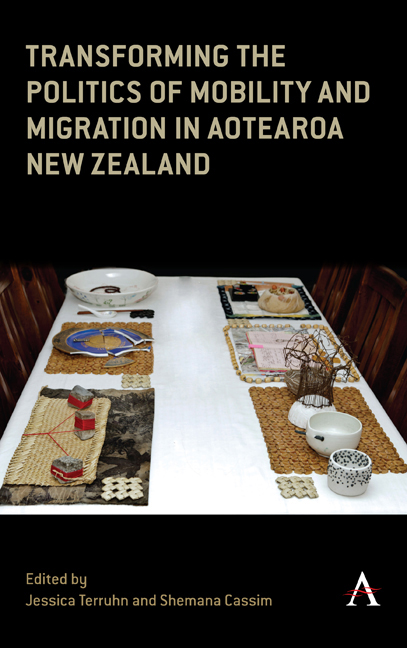Book contents
- Frontmatter
- Contents
- Acknowledgements
- Contributors
- Glossary of Te Reo Māori Words
- Glossary of Te Reo Māori Place Names
- Glossary of Other Non-English Words
- List of Tables
- List of Figures
- Introduction: Reimagining the Politics of Mobility and Migration Through Decolonisation, Social Justice and Solidarities
- Cover Artwork: A Place at the Kauri Table Revisited … 2021
- Part One Decolonising the Politics of Migration
- Part Two Humanising the Politics of Transnational Mobility
- Part Three Building Solidarities for Migrant Rights and Belonging
- Conclusion: Towards Transforming the Politics of Mobility and Migration in Aotearoa New Zealand
- Index
Commentary: Migrant Lives Matter – A Call to End Precarity and Exploitation
Published online by Cambridge University Press: 28 February 2024
- Frontmatter
- Contents
- Acknowledgements
- Contributors
- Glossary of Te Reo Māori Words
- Glossary of Te Reo Māori Place Names
- Glossary of Other Non-English Words
- List of Tables
- List of Figures
- Introduction: Reimagining the Politics of Mobility and Migration Through Decolonisation, Social Justice and Solidarities
- Cover Artwork: A Place at the Kauri Table Revisited … 2021
- Part One Decolonising the Politics of Migration
- Part Two Humanising the Politics of Transnational Mobility
- Part Three Building Solidarities for Migrant Rights and Belonging
- Conclusion: Towards Transforming the Politics of Mobility and Migration in Aotearoa New Zealand
- Index
Summary
The nature and extent of the problems faced by temporary migrant workers in Aotearoa New Zealand (hereafter, Aotearoa) workplaces were first realised in 2010 by social justice activists – themselves migrants – and the fast-food workers union Unite. This realisation led to the formation of a dedicated organisation, the Indian Workers Association, in October 2012. Within weeks it became obvious that temporary migrants from most countries were victims of exploitation and other workplace issues. Accordingly, the name of the newly formed organisation was changed to Migrant Workers Association.
By 2017, the Migrant Workers Association had successfully resolved many employment disputes. The Association also started to raise awareness about work rights and immigration matters through a weekly radio show, which led a campaign to overturn unfair deportations of several international students. Taking stock of the width, breadth and depth of the issues that migrants faced, and drawing inspiration from the Black Lives Matter movement in the United States, the Migrant Lives Matter campaign was launched in October 2017 at the Auckland Unitarian Church. Among other things, the purpose of this campaign was to remind the newly formed Labour Coalition Government to deliver on its promise to bring back the international students recently deported. Following a successful campaign, the students were returned to Aotearoa in 2018 and 2019.
While the world admires Aotearoa for its kindness, inclusiveness and compassion following the Christchurch mosque terror attacks and in handling the Covid-19 pandemic, activists in Aotearoa have made continuous efforts to shine a light on the plight of migrant workers who are holding temporary work visas. Traditionally, trade unions and workers associations have been at the forefront of raising a voice against migrant exploitation and bringing the issue to the political arena as well as societal platforms. More recently, many newly formed migrant groups and employer associations have also joined the struggle.
The exploitation of temporary migrant workers was rife before the Covid-19 pandemic hit in early 2020, but the last few months have shown us an endless number of sham redundancies, wage-subsidy thefts and much more dished out by exploiting employers. The Government made some minor provisions, often quite late in the piece, to provide temporary relief; for example, automatic visa extensions for some visa categories and some relaxation of conditions for employer-supported visas. While these changes are welcome, they are only window dressing and do not address the root cause of migrant exploitation.
- Type
- Chapter
- Information
- Publisher: Anthem PressPrint publication year: 2023

